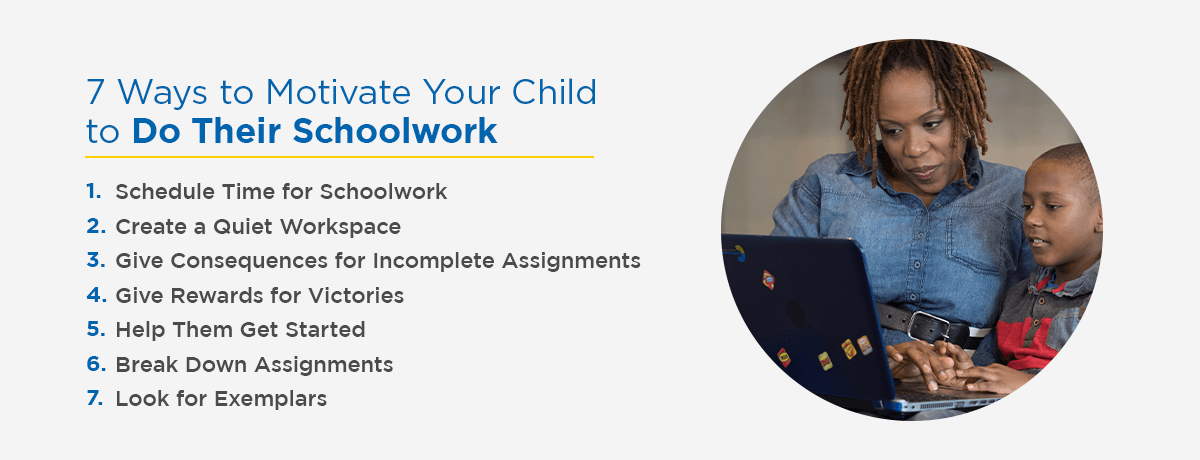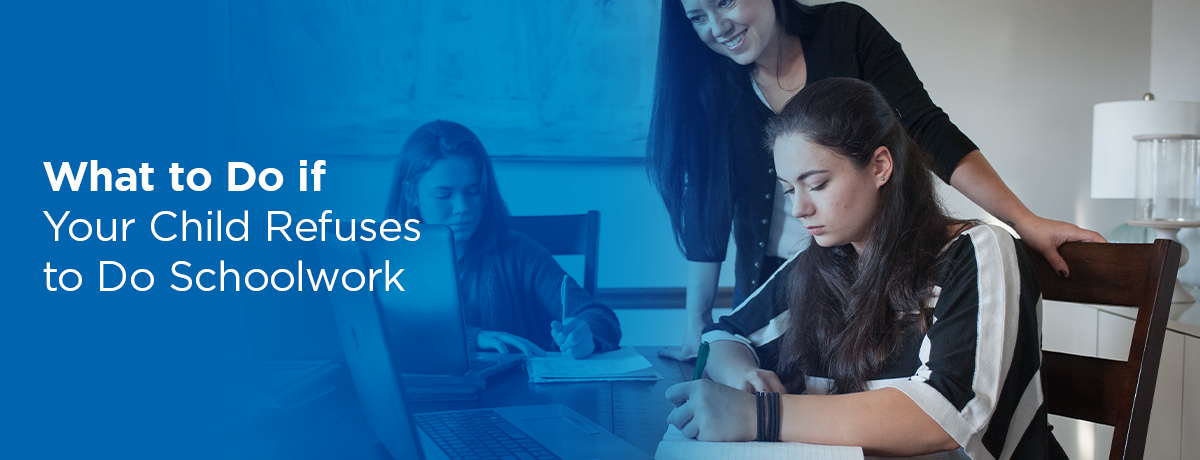Schoolwork, assignments, and projects are typically created to reinforce the skills and content taught in the classroom. The goal is to measure how much of that information students retain and whether it needs to be reviewed again at school. Completing schoolwork can be a struggle for some students, affecting their home and school lives. For example, when kids have difficulty completing assignments, they might receive poor grades or get into arguments with you at home.
Understanding why your child refuses to do schoolwork can show you the best way to help them.
Common Causes of Schoolwork Struggles
Kids refusing to do schoolwork is common, and many parents face the challenge of getting their kids to complete their work on a nightly basis. Understanding the common causes of schoolwork struggles can help you best determine how to help your child complete their work. Here are a few possible causes of why your child refuses to do schoolwork:
- The assignment is hard for them or they don’t know how to do it.
- They don’t like schoolwork or would rather do something else.
- They are overwhelmed by the amount of schoolwork they have.
- They are involved in too many extracurricular activities.
- They can’t concentrate at home or need a quieter place to work.
- They need more support from family, teachers, or tutors.
- They refuse to attend school.
While kids may struggle with schoolwork for any number of reasons, there are a few things you can do to help understand their struggles, including:
- Differentiating between “what if” and reality: Many kids get stuck in a “what if” cycle. Help your child differentiate between “what ifs” and what is. For example, if they say, “What if my teacher doesn’t like me?” you may say, “We met your teacher at the open house, and he was really nice.”
- Identify stressors: Many times, something going on at home or school contributes to the “why.” Identifying stressors or reasons your child won’t do schoolwork is crucial to overcoming it.
- Be patient: Show your student patience, support, and compassion.
- Have flexible expectations: Allow your expectations to be flexible, and leave room for compromise.

7 Ways to Motivate Your Child to Do Their Schoolwork
As a parent, you are often your child’s biggest supporter and motivator. Keep these practical tips in mind when trying to motivate your student to complete their schoolwork.
1. Schedule Time for Schoolwork
Set up a structured evening routine with designated time for schoolwork. Most often, kids immediately transition into “freedom” mode after school. Creating an after-school routine that requires them to complete schoolwork first helps keep them in a learning mindset even after the school day. Implement a rule that says the next part of their night, like free time or extracurricular activities, begins after they complete schoolwork.
Keep in mind that you may want to sit down with them, especially if the school schedule is new. Consistently sticking with a structured evening routine will help your child get into the habit of completing their work right away.
2. Create a Quiet Workspace
A common reason kids struggle with schoolwork is they lack a distraction-free environment at home. Kids are easily distracted, so it’s extremely helpful to give them a quiet workspace without distractions. For example, encourage other family members to be quiet or go into another room while your student works.
Your child’s quiet workspace should be somewhere you can monitor them while they complete schoolwork. This allows you to help prevent distractions and provide assistance when needed. Many parents encourage working at the kitchen table so they can complete their evening tasks while still being around to answer school-related questions.
3. Give Consequences for Incomplete Assignments
With so many potential causes for schoolwork struggles, you don’t necessarily want to punish your kids for not completing their schoolwork. However, you should give consequences for incomplete assignments. Schoolwork should be viewed as a responsibility — much like chores around the house or caring for a pet.
Consequences teach kids there are repercussions for not meeting their responsibilities. With schoolwork, it’s typically best to give short-term consequences to give kids a chance to keep trying without feeling completely discouraged. For example, if your child doesn’t finish their schoolwork for the evening, you may take away their electronics privileges for the rest of the night. This gives them another chance to finish their schoolwork tomorrow and earn that privilege.
4. Give Rewards for Victories
There are consequences for not completing schoolwork, so you need to reinforce positive behavior and give rewards for doing well. Rewards serve as incentives for good grades, achievements, and other positive schoolwork behavior. They are not meant to bribe students. The difference is that rewards are given after something is done well, not in exchange for simply handling responsibilities.
5. Help Them Get Started
Helping your student begin an assignment can be a great way to ensure they actually start. Assisting your student at the beginning can help give them momentum to finish. It’s also an opportunity to ensure they understand the assignment. Because the challenge of starting a project is one of the top reasons kids refuse to do their schoolwork, you may be able to provide encouragement when you give them help at the beginning.
6. Break Down Assignments
Sometimes an assignment seems overwhelming or too big, which can hold kids back from working. Try helping your kids break the assignment into smaller, more manageable chunks. Breaking down assignments can help kids change their perception of their potentially daunting assignments and sets them up for success in the future.
7. Look for Exemplars
Some kids struggle to envision what their final product should be for a project or assignment, so they’re more hesitant to start. Showing your student exemplars provides them with a starting point or a vision for the final project. Some inspiration can give them something to aim for.
Ignite Your Child’s Passion for Learning With CCA
If you’re looking for a different learning experience for your child, consider enrolling them at Commonwealth Charter Academy (CCA). At CCA, students, families, parents, and teachers all have specific roles in the learning environment to create a successful partnership and adequately support your students. We provide different levels of support to foster independence and responsibility as students age. You and your student will work closely with our school staff members to ensure your family has what you need to be successful at CCA.
Request more information online or enroll today to get started.




